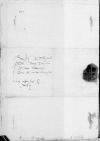Letter #2519
Nicolas PERRENOT de Granvelle to Ioannes DANTISCUSSiena, 1541-12-20
| received Heilsberg (Lidzbark Warmiński), 1542-04-08 Manuscript sources:
Auxiliary sources:
Prints:
| ||||||||||
Text & apparatus & commentaryPlain textText & commentaryText & apparatus
Reverendissimo et Illustrissimo Domino
Reverendissime Domine. Salutem plurimam et obsequium meum paratum.
Binas accepi a Dominatione Vestra Reverendissima eodem argumento, quarum posteriores fuerunt scriptae VII-a Augusti
superioris, utraeque autem continent de cornibus illis onagrorum transmissis in
Deus Optimus Maximus illam sanam et incolumem conservet ad vota.
E(idem) or E(iusdem)⌈E(idem)E(idem) or E(iusdem)⌉
Reverendissiame
D(ominationi) or D(ominationis)⌈D(ominationi)D(ominationi) or D(ominationis)⌉
Vestrae deditissimus


 UUB, H.155, f. 54v
UUB, H.155, f. 54v